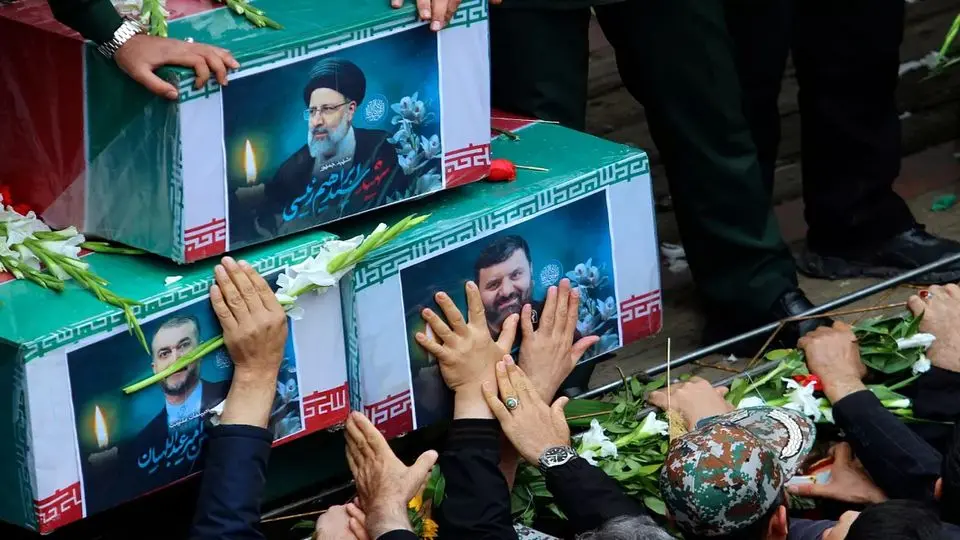A Global Message: Reflecting on the Funeral of Raisi
By: Jalaleddin Fanaei
The funeral of Seyyed Ebrahim Raisi is regarded as a significant and elevated event in Iran, showcasing both national unity and authentic Iranian identity to the world. This ceremony, extensively covered by domestic and international media, not only displayed deep collective emotions but also represented a rational and strategic approach to spiritual and cultural currents, a hallmark of Raisi's influence in highlighting Iran's domestic culture and spiritual aspects.
This massive gathering transcended mere respect for an individual, symbolizing a redefinition and reaffirmation of a forgotten spiritual renaissance that sought to breathe new life into Iranian society. The funeral of Raisi was not just a demonstration of national commitment but also a proclamation for spiritual awakening and the strengthening of the nation's foundations.
The live and precise broadcast of this ceremony by domestic media showcased widespread public attendance and provided deeper analysis and insight into the events, reflecting social commitment and national awakening. Social media platforms also facilitated the exchange of personal experiences and viewpoints, enhancing societal insight and knowledge about the fundamental components and spiritual roles of figures like Raisi in fortifying Iran's cultural and social foundations.
However, the mainstream media coverage of the ceremony appeared carefully curated, with close-up shots dominating the broadcasts, potentially downplaying the true size of the crowd. While many reports cited "thousands" of attendees, population estimation experts suggest that millions participated in the ceremonies. Some networks, like CNN, managed to show parts of the larger crowd, providing a glimpse of the message the Iranian nation sought to convey to the world.
It is important to note that for decades since the 1979 Islamic Revolution, major media outlets and platforms have sought to negatively portray Iran, often characterizing it as unstable, unsafe, barbaric and ruled by a brutal dictatorship system. This biased coverage stands in contrast to the broader international reception of the ceremony, which presented an opportunity to evaluate Iran's image. Western media outlets have repeatedly sought to undermine Iran's legitimacy by characterizing its governance as an illegitimate "regime"—a term used to suggest a crisis of legitimacy. In this way, Western media has tried to depict Iran's governance as disconnected from everyday Iranians and unrepresentative of the nation.
Yet, Iran remains the largest and perhaps the most democratic system in the Middle East, amidst a region dominated by autocratic governments. The event was not only a demonstration of national unity but also a chance to reflect the shared relationships and values upheld by the Iranian people. Providing a comprehensive and balanced perspective on such events is crucial for promoting mutual understanding between Iran and the international community. Rather than perpetuating narratives that fail to capture Iran's full complexity, a nuanced approach is necessary to foster genuine dialogue and cooperation.
The phenomenon of massive public participation in political-religious events, such as the funerals of General Qasem Soleimani and President Raisi, highlights a significant and undeniable reality: the true nature of Iranian society is often misrepresented in Western media and scholarly texts. Social and political science writers must address how, despite their claims of a deep divide between the government and the people, millions of Iranians attended the funerals of their leaders, grieving deeply for their government officials and political representatives.
So-called Iran experts are required to explain how, from their perspective, this group numbering in the millions does not represent the broader Iranian populace, but rather a specific and limited faction that advocates for values antithetical to Iranian culture and lifestyle. These values, including the promotion of nudity and immodesty, originate from modern Western culture, where materialistic and hedonistic ideals are often prioritized. Such values have warped societies they have infiltrated, to the extent that gender identification has become a primary focus and the hottest topic of discussion. These values have been encroaching upon various societies, including Iran, for years through platforms like movies, social media, and news outlets.
The funeral of Seyyed Ebrahim Raisi was a profound affirmation of Iran's national spirit and the unity of its people. The ceremony showcased the Iranian nation's integrity, resilience, and steadfast commitment to its strategic and spiritual goals. By participating in this significant event, Iranians demonstrated their unwavering connection to their leaders and cultural roots, challenging narratives that seek to misrepresent their society.
The broad international reception of Raisi's funeral highlighted the need for a balanced understanding of Iran, in contrast to the often one-sided portrayal seen in Western media. The event underscored the nation's integrity and solidarity, reaffirming a deep cultural and spiritual heritage that transcends political divides.
In conclusion, the funeral of Seyyed Ebrahim Raisi was more than a moment of national mourning; it was a declaration of the Iranian people's unity, resolve, and dedication to preserving their cultural identity and spiritual values, such as supporting the oppressed people of Palestine, combating Islamophobia, and rejecting new forms of colonialism and hegemonic policies.

